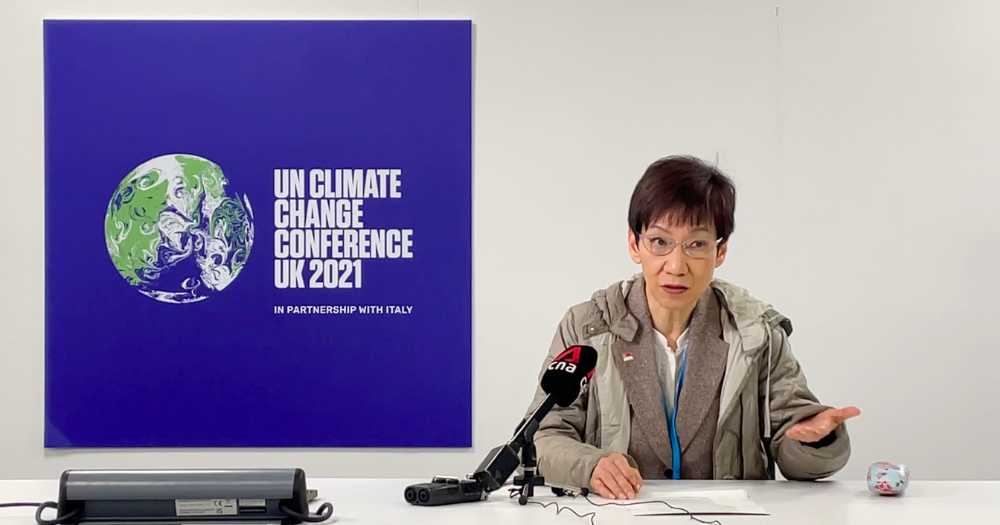Follow us on Telegram for the latest updates: https://t.me/mothershipsg
REPORTING FROM GLASGOW, SCOTLAND
The global climate talks, COP26, has drawn to a close on Nov. 14, a day after its scheduled conclusion.
"While the work is not quite done yet, COP26 has laid a firm foundation for future progress," said Minister for Sustainability and the Environment Grace Fu in a round-up with media at COP26.
Accelerating momentum for global climate action
Fu said that it has been "the most productive conference" as it had demonstrated accelerating momentum for global climate action, and added that COP26 was a "big win" for the multilateral approach to addressing climate change.
This was seen from the return of the U.S. to the Paris Agreement, as well as the U.S.-China climate pact announced by the two nations on the second week of the summit.
Climate action is a topic that all countries share a lot of commonalities and common concerns even for countries that are contesting in other areas, Fu added.
Fu shared the progress made at COP26 in view of the four key objectives that were previously laid out in her national statement: Ambition, Finance, Rulebook, and Partnerships.
Ambition
Mitigation-wise, "the UK COP Presidency has kept alive the 1.5ºC goal," Fu said.
Parties will revisit and strengthen their Nationally Determined Contributions (NDCs) and Long-term Low Emissions and Development Strategies (LEDS) targets as necessary to be compatible with the 1.5ºC Paris Agreement temperature goal.
According to the finalised Glasgow Climate Pact, countries will have to strengthen their 2030 targets by end of next year.
Parties have also committed to accelerating efforts in phasing down unabated coal power and phasing out inefficient fossil fuel subsidies.
India and China had requested for a change to the language of the agreement in the last minute, resulting in the weakening of language used in the text for the portion in relation to the use of fossil fuels.
For adaptation, a new Work Programme on the Global Goal on Adaptation (GGA) was created to help Parties assess progress on adaptation toward the first Global Stocktake (GST) in 2023.
This will be informed by the forthcoming Intergovernmental Panel on Climate Change (IPCC) Working Group III report.
Rulebook
Fu co-faciliated the ministerial consultations for Article 6, a long overdue component of the Paris Agreement dealing with carbon markets.
Parties have reached a compromise on the issue of Article 6, ultimately finalising the rulebook for the Paris Agreement.
All Parties have agreed on a standardised reporting structure, which is important for compliance and reporting, said Fu.
Parties have also agreed on a five-year common time frame for reporting Nationally Determined Contributions (NDCs), this was an outstanding item resolved at COP26.
Article 6 has established the Glasgow Committee on Non-Market Approaches, providing an opportunity for Parties who are not participating in the carbon market to still benefit from international collaboration in terms of capability building and technological transfer.
Finance
Developed countries have promised to at least double adaptation finance by 2025 from 2019 levels.
"This means that there is a greater weightage of adaptation versus mitigation," said Fu.
This is an especially key objective for the Alliance of Small Island States (AOSIS) members, which Singapore is a part of, Fu explained.
Stronger pledges for adaptation finance were seen from Japan, Canada, Norway, Australia, Switzerland, and the U.S..
A new Ad Hoc Work Programme will also deliver New Collective Quantified Goal (NCG) on Climate Finance by 2024, this will kickstart discussions on how climate finance should be delivered post-2025.
The final outcome of COP26 also sees a strengthened recognition of need to tackle loss and damage for countries affected by extreme weather, with the operationalisation of the Santiago Network for Loss and Damage to assist these affected countries.
That said, developing and island state countries did not get to see the establishment of a loss and damage fund facility at COP26 as they had hoped for.
Partnerships
Stronger collaborations have been forged at the climate talks, including an improvement of the Marrakech Partnership for Global Climate Action.
The partnership enables governments to work with cities, regions, businesses and investors to further climate actions.
At COP26, Singapore has deepened climate-related partnerships by joining several global initiatives.
Singapore is now part of these initiatives:
- The Powering Past Coal Alliance, where Singapore is committing to phasing out unabated coal power by 2050.
- The Greening Government Initiative where country governments share information and best practices for green government operations
- The Agriculture Innovation Mission for Climate (AIM4C) which looks at agricultural R&D and innovation
- The Global Methane Pledge, committing to collectively reduce global anthropogenic methane emissions across all sectors by at least 30 per cent below 2020 levels by 2030. Methane, which stays in the atmosphere for about 10 years, is more than 25 times as potent as carbon dioxide at trapping heat.
- The Glasgow Leaders' Declaration on Forests and Land Use, which pledges to halt and reverse deforestation and land degradation by 2030.
- A project-collaboration with Japan under the Partnership to Strengthen Transparency for Co-Innovation, where Singapore and Japan will develop and implement ways to monitor, report and verify carbon emissions for businesses and facilities in Asean countries.
Fu also mentioned having fruitful discussions on innovative solutions for sustainability with Ministerial counterparts from China, India, UAE, Russia, Japan, Malaysia and Brunei through bilateral meetings at COP26.
Other articles related to COP26
Follow and listen to our podcast here
Top image by Kow Zi Shan.
If you like what you read, follow us on Facebook, Instagram, Twitter and Telegram to get the latest updates.

